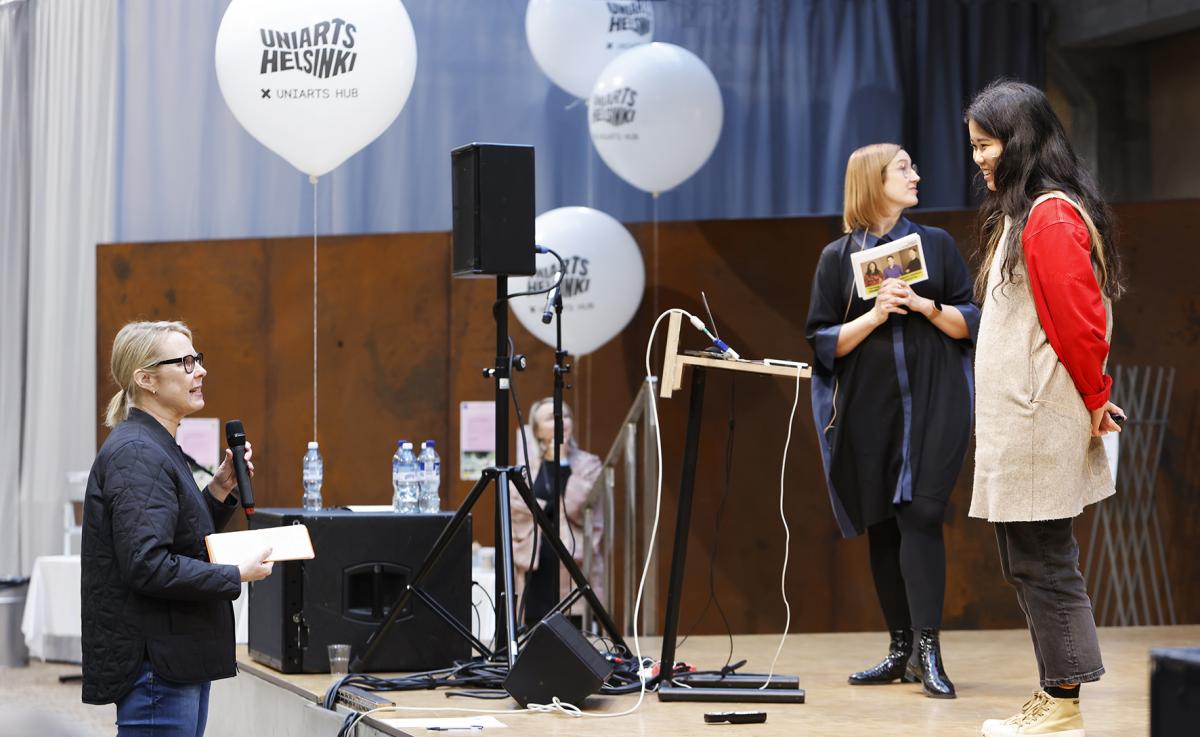Art-Ups stepping into the light
Uniarts Hub pre-incubator programme was launched this fall. We need more discussion around art entrepreneurship and the ways of doing business in art, project manager Kati Uusi-Rauva writes.

Slush, the major start-up-happening was just held in Helsinki. 12 000 business innovators and their investors met in Helsinki Fair Center. In Uniarts Helsinki, we had an official side-event in Theatre Academy, Uniarts Hub Demo Day, which was the first-ever Slush event organized for artists pitching their ideas for a jury. And did they rock on the stage!
We have run a pre-incubator program for artists from different fields of arts during autumn 2022. 11 participants have been developing and testing their business ideas and now they are in the point of making the decision of establishing a company. During the fall there are a few main findings, that are particular for arts’ world when we think about opportunities in the business world.
Artists are entrepreneurs
Firstly, many artists are entrepreneurs. In Finnish creative industries – which includes also all cultural and art fields – 24% of professionals work as entrepreneurs (Creative Finland 2019, Creative industries of Finland infograph), which is double as much as in other industries on average. According to the student and alumni surveys, for recently graduated and alumni becoming an entrepreneur is fairly often the first choice.
However, artists do not talk about their entrepreneurship very often. In fact, they merely keep silent about it. Traditionally, artists haven’t got formal business education as part of their professional education. Currently, entrepreneurial skills are typically aquired in practice after founding a company or in a course provided by a training organization typically not very familiar to the every-day life in arts.
Being an entrepreneur is often a must
An artist is often forced to become an entrepreneur. They become entrepreneurs, full or part-time, due to requirements from the environment. In most cases this is due to necessity to invoice a client. A musician and a performing artist must invoice for a gig, a writer must invoice for a text to a publication, a painter must invoice the client organization for a custom order.
Artists are shy about them being entrepreneurs because they often feel they do not have business know-how, and this is understandable, considering what was said here earlier. But they are also cautious because they feel that being an entrepreneur, especially a successful one, might harm their profile as artist, and in some occasions even have an effect on opportunities to get funding.
Finding a mutual language
Business advisors are not always aware of the dynamics in different sectors of arts, either. This has lead to inability on both sides to understand each other. This is luckily changing little by little, as both arts education, artists on the global markets and business world are getting more and more interested in each other. We are certainly expecting more business orientation within arts among future generations.
Hiring business to serve arts
As being an entrepreneur is a hush-hush theme in arts and because we will head for times where global competition gets tougher and public funding more rare, it is good to open up discussion around art entrepreneurship and the ways of doing business in art. The companies are often more flexible to utilize immaterial property, which is always created when creating art, as a source of business, and this is something art world should develop further (Cupore, Barometre for arts and culture 2019). For sure, there are ways of doing business that support the art, and not vice versa. A business in arts is a tool, not a purpose.
Strong value-base
Artists as entrepreneurs are creating their business concepts on strong value-base, which they cannot act against. Hence art enterprises are highly ethical, often uncompromising and serving the purpose of artistic expression in a way or another.
Art-driven business ideas are often sustainable too, socially, ecologically and (yes, it can happen in arts too, despite strong public funding) financially. Companies are not driven by maximum profit but by maximum artistic success, money will follow the success if lucky. This is different logics from start-up-culture, but on the other hand they do not exclude each other. It is possible to achieve both, if it serves the purpose.
Art-ups in the making
All this leads to conclusion that we can start talking about art-ups instead of start-ups, at least for now, as art entrepreneurship is taking steps further in the modern, post-pandemic and digitalized world, and we as supporters in Uniarts are building the tool-kit for artists on their path to sustainable livelihood. This new Uniarts Hub blog will also carry the name of Art-up.
Being an entrepreneur can be a valid option for many artists. To build a sustainable business model and to succeed, an artist or team needs support and know-how in their networks.
And with this support, did our first participants rock on stage – all the success for these courageous people!
Writers: Kati Uusi-Rauva, Project Manager of Uniarts Hub, in co-operation with lectors Riitta Huttunen, Jari Perkiömäki and Satu Tuittila
Photo: Maarit Kytöharju
Art-Up: Artists in Business
Uniarts Hub pre-incubator programmer’s blog showcases the possibilities of entrepreneurship in the culture and arts industries.
Here you’ll get to know the Hub’s participants, inspiring people in the industry and thoughts on how to combine artistry and business.
Read more about the Uniarts Hub programme.
Latest posts
-
Creativity and Entrepreneurship: My Journey in the Uniarts Hub Pre-Incubator Program
-
Entrepreneurs in the creative sector pitched their fresh ideas in the Creatives Meetup event
Follow blog
Comments